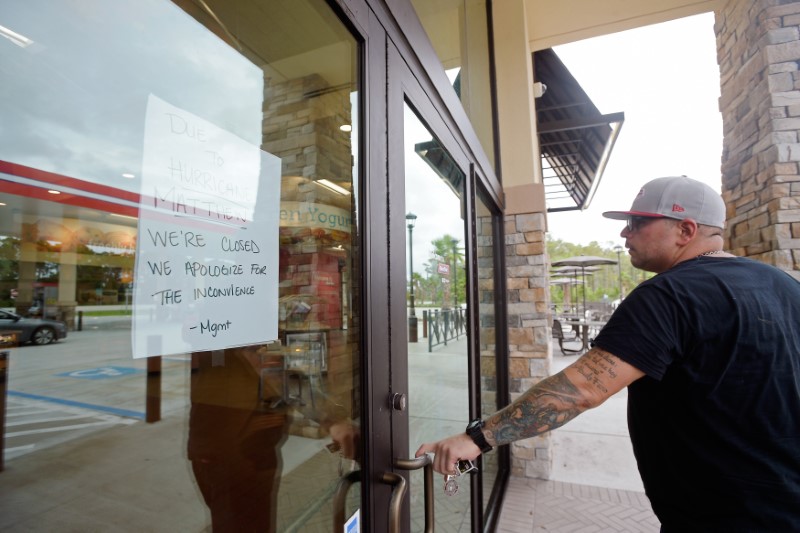By Beth Pinsker
NEW YORK (Reuters) - After Hurricane Matthew blows by the U.S. Southeast, the insurance adjusters will come out.
Here are five tips on dealing with the aftermath, from Loretta Worters, vice president of the Insurance Information Institute trade group:
1. Your roof blows off
Windstorm damage is covered under standard homeowners policies, both for private homes and privately owned apartments, and under renters policies for damage to personal belongings. But there may be significant differences in deductibles, depending on your state. Policy parameters may vary when it comes to the storm's severity. In Florida, you may pay more - up to a 15 percent deductible - depending on your proximity to the coast.
Any rain damage to the interior and your furnishings that occurs because of a hole blown in your building will also be covered, but not if the water is rising from the ground in a flooding situation.
2. Street flooding swamps your house
Flooding from the ground up is not covered by standard homeowners policies. No matter how many times insurance professionals point this out, people tend to forget about flood coverage or just do not want to deal with the additional costs. You need to get a flood policy directly from the government, with prices varying by risk zones (www.floodsmart.gov).
"People will buy a Starbucks (NASDAQ:SBUX) coffee every day for a year, and that's OK. That's not too far away in price from getting the flood insurance, but they won't get it," says Worters.
For those living in apartment buildings, it is important to find out if the building has flood coverage as well, Worters notes.
3. A tree falls on your house
Tree damage is one of the most common problems after a big storm. After the storm, however, adjusters tend to the biggest claims first. You might wait a while for your turn, especially if there are power outages in your area.
Worters says it is fine to go ahead and make minor fixes to prevent more damage from happening. Just take pictures first and do not risk any personal injuries walking on shaky roofs or climbing a teetering tree.
To prepare ahead of time, take a photo inventory of your house and store it online. The Insurance Information Institute provides a free app called Know Your Stuff (knowyourstuff.org/) for this purpose.
4. Your car gets submerged or damaged by debris
Auto damage is probably the easiest disaster to deal with because storm damage is covered under the comprehensive section of your auto policy. This type of coverage is optional in most states, but many car owners take it out anyway.
It does not matter if your car is parked on the street or in a garage when the damage happens, if it is hit by a falling branch or by a floating hazard. "It's very clear-cut," says Worters.
5. Your insurance company goes bankrupt
When Hurricane Andrew hit Florida in 1992, it caused $24 billion in damages to Florida and Louisiana, according to the Insurance Information Institute. Over the ensuing years, seven of the 10 costliest hurricanes have involved Florida. That has driven insurance companies out of business and raised rates in other states as national companies try to recoup their losses.
But the industry is on good financial footing right now, according to Worters, with a record surplus industry wide of more than $680 billion. In case of problems with smaller companies, there is a guarantee fund that protects policyholders if their provider goes belly-up.

"They're in the best shape ever to pay claims," says Worters.